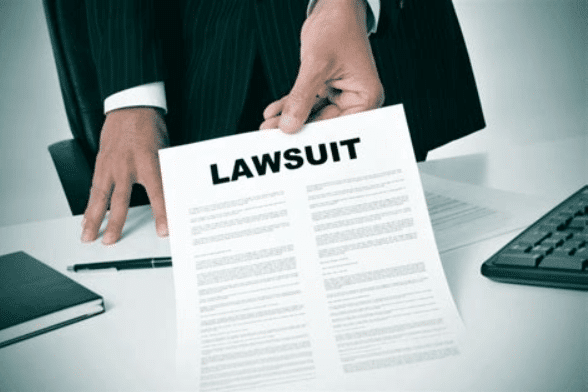Facing a lawsuit from C. Tech Collections (CTC) can be daunting, but with the right approach, you can effectively defend yourself and achieve a favorable outcome. ZumaZip offers a fast and efficient way to respond to the lawsuit and increase your chances of winning.
CTC is known for its aggressive tactics in debt collection, but it’s essential to remember that you have rights and options available to you. While the prospect of going to court may seem overwhelming, it’s important to stay focused and informed about how to navigate the legal process effectively.
Feeling stressed or anxious about the situation is normal, but don’t let it deter you from taking action. By learning about your rights and the best strategies for defending yourself against CTC, you can approach the situation with confidence and determination.
In this guide, we’ll provide you with valuable insights and practical tips to help you defend yourself and beat CTC in court. With the right knowledge and preparation, you can navigate the legal process successfully and protect your rights as a consumer.
Use ZumaZip to make the right defense.
Learn More About CTC
Understanding CTC (C. Tech Collections) and their practices is crucial when dealing with debt collection challenges. With over 30 years of experience in debt collection, CTC possesses a deep understanding of the legal landscape governing their industry.
However, this expertise doesn’t guarantee compliance with regulations. Complaints against CTC suggest instances where they may have strayed from the boundaries set by the Fair Debt Collection Practices Act (FDCPA). This legislation exists to safeguard individuals from abusive or threatening behavior from debt collectors.
Regardless of CTC’s actions, it’s essential to adhere to key steps to achieve the best outcome in court. Despite any challenges you may face, it’s important to recognize that you have rights and protections under the law. By following the appropriate procedures and seeking legal guidance when necessary, you can work towards a favorable resolution to your case.
Regardless of their actions, there are some key steps you need to follow to ensure that you get the best outcome in court. Even if it doesn’t feel like it, you have a lot of things working in your favor.
Beat CTC in Court
Remain Calm
Maintaining composure is key during this process. Panicking can cloud your judgment and hinder your ability to execute your strategy effectively. By staying calm, you can focus on implementing your plan with clarity and confidence.
Despite any intimidating tactics employed by the debt collector, refrain from sending a check or disclosing your bank account information. Doing so may inadvertently concede guilt and give the collector an advantage.
Rather than succumbing to pressure, seek guidance from a legal expert who can offer invaluable advice on navigating CTC’s tactics. With the support of a legal professional, you can approach the situation strategically and assert your rights with confidence.
File a response the easy way with ZumaZip.
Get Legal Counsel
While representing yourself in court is an option, having the guidance of a trusted debt collection attorney can greatly enhance your experience and increase your chances of a favorable outcome.
However, if you opt to represent yourself, thorough preparation is essential. Start by gathering all relevant documentation pertaining to your debt. This includes any correspondence from the debt collector, records of payments made, and any other pertinent information related to the case.
While legal counsel isn’t mandatory, their expertise can provide invaluable support and ensure you navigate the legal process effectively. Consider seeking consultation with a debt collection attorney to assess your options and determine the best course of action for your situation.
Send a Request for Production of Documents
This standard practice involves requesting proof from the debt collector to verify your responsibility for a debt. It’s worth noting that debt collection agencies may not always be thorough or honest in their practices, and mistakes or attempts to collect debts outside of the statutes of limitations can occur.
To protect yourself, it’s essential to ensure you have legitimate evidence from CTC confirming the validity of the debt. Requesting this documentation via certified mail adds an extra layer of credibility to your request. If CTC fails to provide the necessary documentation, you effectively strengthen your case.
Furthermore, by asserting your right to this information, you demonstrate that you won’t be intimidated by aggressive debt collection tactics. In many cases, debt collection agencies have dropped lawsuits upon receiving a Request for Production of Documents.
However, if CTC does provide the requested information, it’s important to proceed to the next step of your strategy. This proactive approach empowers you to defend your rights and interests effectively during the legal process.
Use ZumaZip to respond to debt collectors in 15 minutes.
Attend Court as Directed
Attending your court date as directed is crucial to ensure a fair resolution to your case. Failure to appear could result in an automatic judgment in favor of CTC, leaving you responsible for the debt.
On the other hand, if you do appear but CTC fails to do so, you may automatically win the case. While this outcome is possible, it’s essential to prepare as if CTC will be present. Being proactive and ready for court proceedings is key to protecting your rights and interests.
When court commences, it’s essential to be prepared and know how to present your case effectively. Consider consulting with a legal advisor or preparing relevant documentation to support your position. By being proactive and informed, you can navigate the legal process confidently and work towards a favorable outcome.
Come to Court Prepared
During your court date, you need to come ready to win. This means not admitting that you owe the debt and trying to play on the heart of the judge. Instead, you need to remain professional at all times. When it is your turn to speak, you need to question the legitimacy of the debt.
Again, never admit that it’s yours. On the contrary, you need to see tangible proof that you are responsible for paying the amount in question. Unless CTC can show you a copy of the debt with your legal signature on it, you have the right to contest anything presented to you or the court.
Furthermore, anything else that is presented is only heresy. If CTC can present a signed document made by you, you then have the legal right to claim that CTC is not the original owner of the debt, which they aren’t.
At this juncture, it’s up to CTC to provide documentation that the debt was legally sold to them and that they have a right to collect on it. Due to the nature in which debt collection agencies buy debt, it is unlikely that they will be able to show this proof.
If this is the case, you will have won. If CTC can produce the original signed document and show the court that you legally owe the debt, you may just have to admit defeat and agree to pay the debt.
What is ZumaZip?
ZumaZip is a convenient solution designed to streamline your response to a debt collection lawsuit. Here’s a breakdown of what you can expect when you use ZumaZip:
Firstly, you’ll access our user-friendly web application, which guides you through the process step by step. You’ll be prompted to answer a series of questions related to your specific situation. Once you’ve completed the questionnaire, you have the option to either print out the finalized forms and mail them to the appropriate courts yourself, or you can opt to utilize ZumaZip’s services to file them on your behalf. Additionally, if you choose this option, an attorney will review your document for added peace of mind.
If you’re seeking guidance on how to effectively respond to a debt collection lawsuit, ZumaZip can provide the assistance you need. Feel free to explore our FAQs for more information on what ZumaZip has to offer.
What if I haven’t been sued yet?
If you’ve only received a collections notice, but not a lawsuit, the best way to respond is with a Debt Validation Letter. When a debt collector contacts you in any way, whether it’s by phone or mail, you can respond by formally requesting a debt validation with a Debt Validation Letter . This letter notifies the collector that you dispute the debt and forces them to provide proof you owe the debt. They can’t call you or continue collecting until they provide validation of the debt. This flowchart shows how you can use a Debt Validation Letter to win.
Get started with a Debt Validation Letter here.
How to Answer a Summons for debt collection in all 50 states
Here’s a list of guides on how to respond to a debt collection lawsuit in each state:
- Alabama
- Alaska
- Arizona
- Arkansas
- California
- Colorado
- Connecticut
- Delaware
- Florida
- Georgia
- Hawaii
- Idaho
- Illinois
- Indiana
- Iowa
- Kansas
- Kentucky
- Louisiana
- Maine
- Maryland
- Massachusetts
- Michigan
- Minnesota
- Mississippi
- Missouri
- Montana
- Nebraska
- Nevada
- New Hampshire
- New Jersey
- New Mexico
- New York
- North Carolina
- North Dakota
- Ohio
- Oklahoma
- Oregon
- Pennsylvania
- Rhode Island
- South Carolina
- South Dakota
- Tennessee
- Texas
- Utah
- Vermont; Vermont (Small Claims court)
- Virginia
- Washington
- West Virginia
- Wisconsin
- Wyoming
Guides on how to beat every debt collector
Hey there! Facing off against a debt collector can feel like a daunting challenge, but fear not! We’re here to help you navigate through it all with our handy guides designed to assist you in beating every debt collector you encounter. Whether you’re facing a new lawsuit or dealing with a persistent collector, we’ve got your back. Stay positive, stay informed, and let’s tackle this together!
- Absolute Resolutions Investments LLC
- Accredited Collection Services
- Alliance One
- Amcol Clmbia
- American Recovery Service
- Asset Acceptance LLC
- Asset Recovery Solutions
- Associated Credit Services
- Autovest LLC
- Cach LLC
- Cavalry SPV I LLC
- Cerastes LLC
- Colinfobur
- Covington Credit
- Crown Asset Management
- CTC Debt Collector
- Cypress Financial Recoveries
- Delanor Kemper & Associates
- Eagle Loan of Ohio
- Educap
- Estate Information Services
- FIA Card Services
- Forster & Garbus
- Freshview Solutions
- Fulton Friedman & Gullace LLP
- Harvest Credit Management
- Howard Lee Schiff
- Hudson & Keyse LLC
- Integras Capital Recovery LLC
- Javitch Block
- Jefferson Capital Systems LLC
- LVNV Funding
- Mannbracken
- Mariner Finance
- Medicredit
- Michael J Adams PC
- Michael J Scott
- Midland Funding LLC
- Mullooly, Jeffrey, Rooney & Flynn
- Mountain Land Collections
- MRS Associates
- National Collegiate Trust
- Nationstar Foreclosure
- Northstar Capital Acquisition
- NCEP LLC
- NRC Collection Agency
- OneMain Financial
- Palisades Collection LLC
- Pallida LLC
- Paragon Revenue Group
- Pinnacle Collections Agency
- PMAB LLC
- Portfolio Recovery Associates
- Provest Law
- PYOD LLC
- Reunion Student Loan Finance Corporation
- Revenue Group
- Regents and Associates
- RSIEH
- Salander Enterprises LLC
- Second Round Sub LLC
- Security Credit Services
- Sherman Financial Group
- Suttell and Hammer
- T-Mobile
- Transworld Systems
- Tulsa Teachers Credit Union
- UCB Collection
- Velo Law Office
- Velocity Investments
- Waypoint Resource Group
- Weinberg and Associates
- Wolpoff & Abramson
Settle your medical debt
Having a health challenge is stressful, but dealing medical debt on top of it is overwhelming. Here are some resources on how to manage medical debt.
- Am I Responsible for My Spouse’s Medical Debt?
- Do I Need a Lawyer for Medical Bills?
- Do I Need a Lawyer to Fight Medical Bill Debt?
- Does Bankruptcy Clear Medical Debt?
- How Much Do Collection Agencies Pay for Medical Debt?
- How to Find Medical Debt Forgiveness Programs
- Is There a Statute of Limitations on Medical Bills?
- Medical Debt Statute of Limitations by State
- Summoned to Court for Medical Bills — What Do I Do?
- Summoned to Court for Medical Bills? What to Do Next
Stop calls from Debt Collectors
Do you keep getting calls from an unknown number, only to realize that it’s a debt collector on the other line? If you’ve been called by any of the following numbers, chances are you have collectors coming after you, and we’ll tell you how to stop them.



































